Number 11
HIMALAYAS PLUS
NOVEMBER-DECEMBER 2024
Dear Friends,
Greetings from the Centre of Excellence for Himalayan Studies, Shiv Nadar Institution of Eminence, Delhi NCR (SNIoE). At the outset, we wish you a happy and fulfilling 2025. We are delighted to present the 11th edition of our Newsletter for November and December 2024. This and previous Newsletters are also available on our website.
ANNOUNCEMENT
We have launched a new one-year non-resident post-doctoral fellowship starting January 2025 as part of our efforts to support advanced research on the wider Himalayan region, with a focus on the following themes – borders and identities, economy, environment, and regional geopolitics. We received over 70 applications and after a highly competitive process, we are happy to announce the selection of Dr. Padma Ladon, Dr. Sangay Lachenpa, Dr. Rinan Shah, and Dr. Rimi Tadu. They represent the length of India’s northern borders – Ladakh, Sikkim, Darjeeling, and Arunachal Pradesh.
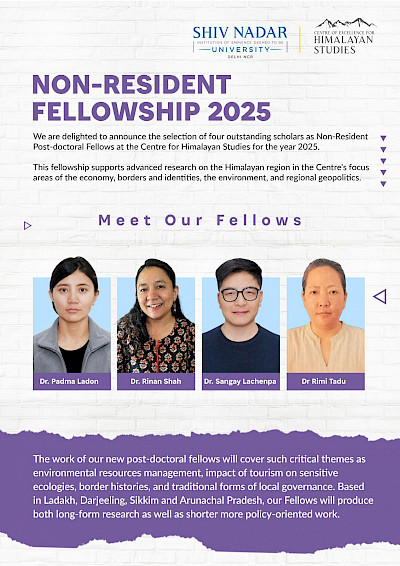
EVENTS
CHS was a co-organizer of the 7th India Forum on China, along with Institute of Chinese Studies, Delhi and School of Government, MIT World Peace University, Pune, from 13-15 December. The theme for this edition of IFC was ‘The Intersection of Science and Technology in China’s Industrial Revolution, and Challenges to India and the World’. The presentations covered industrial innovation, artificial intelligence, semiconductors, green technologies, and military-civil fusion, among others. Our Director, Dr. Jabin T. Jacob made a presentation titled, ‘China’s Military-Civil Fusion as a Development Project’.
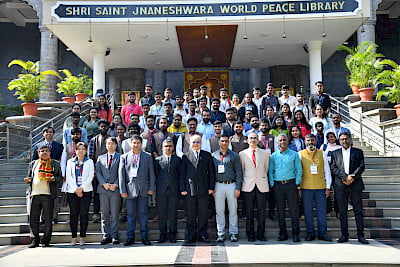


On 8 November, we organized a talk on ‘Geopolitics on the Map: Insights into Military Dynamics along the LAC through Geospatial Intelligence’, by Dr. Y. Nithiyanandam, Head of the Geospatial Research Program, The Takshashila Institution, Bengaluru.
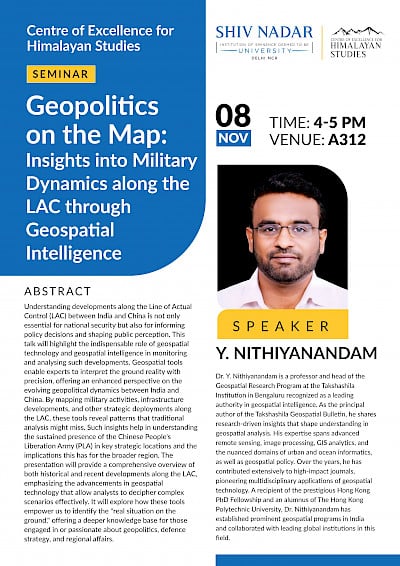
PUBLICATIONS
Our Fellow, Dr. Anand P. Krishnan, authored a Commentary that analyzed the Digital Bharat Nidhi initiative of the Indian government and its role in the development of the country’s border areas.
We have continued with our endeavour of translating our publications into languages spoken widely in the Himalayan region to expand accessibility to our cutting-edge analyses. We had three translations in Urdu – Dr. Jacob’s commentary on the new patrolling agreement between India and China as part of the disengagement process in eastern Ladakh was translated into Urdu and Nepali. Dr. Krishnan’s opinion piece on the impounding of Indian solar panels by US Customs and Indian industry’s dependence on Chinese companies was translated into Nepali as well as Urdu. Two publications by our Associate Fellow, Dr. Devendra Kumar were translated into Tibetan – an Issue Brief on Economic and Technological Zones in Tibet Autonomous Region, and a Commentary on the extension of Xi Jinping’s anti-corruption campaign to China’s space agency. CHS Distinguished Fellow, Mr. Claude Arpi’s piece arguing for China to put its house in order first before training their guns on India’s External Affairs Minister was translated into Chinese. Padma Ladon’s commentary on the preservation of agropastoral practices in Ladakh were translated into Tibetan and Urdu.
CHS Associate Fellow, Dr. Devendra Kumar penned a piece for the China Brief of the Jamestown Foundation on the completion of 30 years of the China’s Tibet Aid Program.
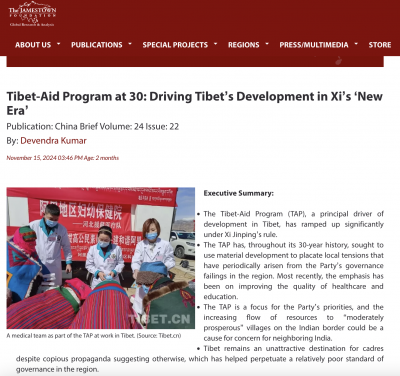
He also wrote on the regional geopolitics and bilateral dimensions of China’s approaches to the BRICS for Transatlantic Policy Quarterly. He also reviewed the book, China’s Rising Foreign Ministry: Practices and Representations of Assertive Diplomacy by Dylan MH Loh for the China Report.
IN THE MEDIA
CHS Director, Dr. Jabin T. Jacob authored a piece on how China uses every opportunity to assert its sense of superiority, for the inaugural issue of the foreign policy magazine, India’s World. In a piece for The Indian Express, Dr. Jacob analyzed the most recent meeting of the Special Representatives of India and China by comparing the statements from each side, and argued that it was China more than India that appeared to have achieved its goals through strategic patience and resolve.
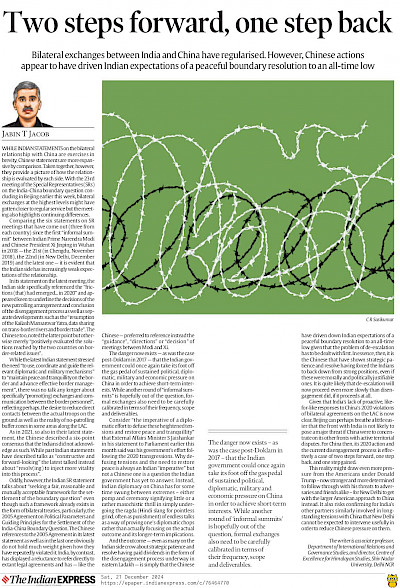
He was also quoted in news reports about the meeting by ETV Bharat and Sputnik Bharat. He spoke on the visit to China by Nepal’s Prime Minister, KP Oli, in early December, as part of Centre for Economic and Social Progress’ podcast series, Sambandh Short Takes.
Our Distinguished Fellow, Mr. Claude Arpi penned two pieces for Firstpost – in the first, he argued that the patrolling agreement between India and China in October 2024 had opened the possibility of re-establishing pilgrimage links for Indians with Tibet while in the second, he discussed the efforts by China to interfere in the process of the Dalai Lama’s succession through the Panchen Lama it had selected.
Associate Fellow, Dr. Devendra Kumar analyzed how China and India were jostling for diplomatic space in Myanmar, in a piece for Deccan Herald.
FACULTY UPDATES
Dr. Jabin T. Jacob delivered a lecture on Tibet in Chinese Foreign Policy at the Indo-Tibetan Border Police headquarters in Delhi on 6 December. He was also a panelist at the presentation of the report on the 19th Russia-India-China Trilateral Academic Conference, at the Institute of Chinese Studies, New Delhi on 9 December.
Mr. Claude Arpi was a panelist at a seminar titled, ‘India-China Border Disputes: Understanding Historical Linkages And Future Challenges’, organized the Indian Army’s Central Command in Lucknow on 6 November. He also undertook fieldwork in various places in Arunachal Pradesh from 19 November-1 December.
CHS Non-Resident Senior Fellow, Prof. Kaveri Gill, presented a paper on secular ethics at an online workshop organised by Nalanda University, Rajgir, Bihar, on 3 December. On 10 December, she also convened a panel, in collaboration with Tibet House Delhi, on the subject of universal ethics in education, on the occasion of the 35th anniversary of the Nobel Peace Prize being awarded to the Dalai Lama.
Dr. Anand P. Krishnan presented a paper on the permeation of Chinese smartphone companies in India’s electronics industry at an international conference, ‘Grounding Global China’, organized by the Centre for Contemporary Chinese Studies, University of Melbourne, Australia from 9-10 December.
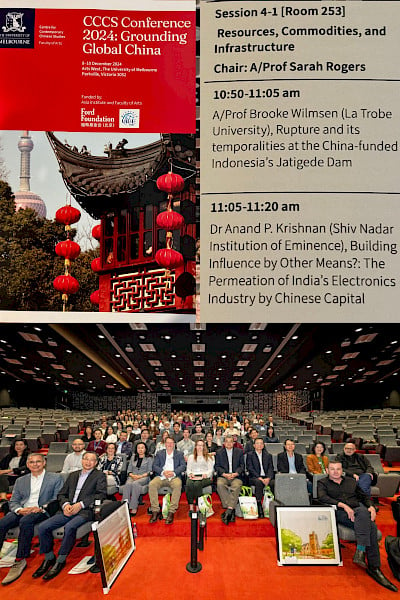
He also made an online presentation on a related topic at the Department of Political Science, University of Hyderabad on 19 November.
Dr. Krishnan took over as Assistant Editor of the peer-reviewed journal, China Report, which is the one of the world’s oldest journals devoted to the study of China and East Asia.
Dr. Kumar delivered two lectures, ‘Recent Infrastructure Developments by China in Ladakh and in the Northeast Sector’ and ‘the Strategic Partnership between China and Nepal: Implications for Indian Interests’, at the Indo-Tibetan Border Police’s Central Training College, at Alwar, Rajasthan on 29 November.
You can stay updated with our publications, events, and activities through our website, X (@Himalayas_SNU), Facebook, and LinkedIn. We welcome your feedback and appreciate your continued support.
Share this: